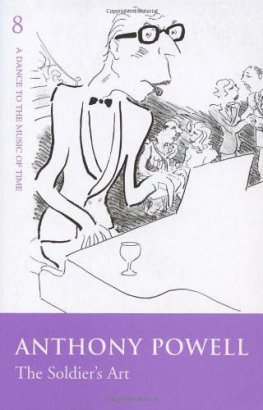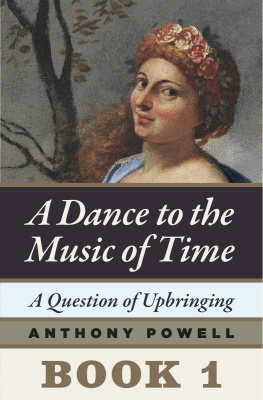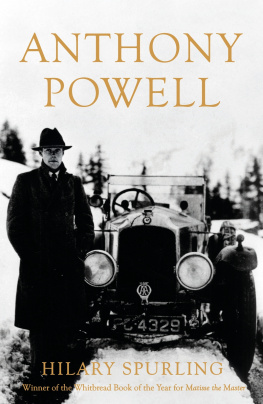Anthony Powell - The Acceptance World
Here you can read online Anthony Powell - The Acceptance World full text of the book (entire story) in english for free. Download pdf and epub, get meaning, cover and reviews about this ebook. genre: Prose. Description of the work, (preface) as well as reviews are available. Best literature library LitArk.com created for fans of good reading and offers a wide selection of genres:
Romance novel
Science fiction
Adventure
Detective
Science
History
Home and family
Prose
Art
Politics
Computer
Non-fiction
Religion
Business
Children
Humor
Choose a favorite category and find really read worthwhile books. Enjoy immersion in the world of imagination, feel the emotions of the characters or learn something new for yourself, make an fascinating discovery.

- Book:
- Author:
- Genre:
- Rating:3 / 5
- Favourites:Add to favourites
- Your mark:
- 60
- 1
- 2
- 3
- 4
- 5
: summary, description and annotation
We offer to read an annotation, description, summary or preface (depends on what the author of the book "" wrote himself). If you haven't found the necessary information about the book — write in the comments, we will try to find it.
— read online for free the complete book (whole text) full work
Below is the text of the book, divided by pages. System saving the place of the last page read, allows you to conveniently read the book "" online for free, without having to search again every time where you left off. Put a bookmark, and you can go to the page where you finished reading at any time.
Font size:
Interval:
Bookmark:
Anthony Powell
The Acceptance World
1
ONCE in a way, perhaps as often as every eighteen months, an invitation to Sunday afternoon tea at the Ufford would arrive on a postcard addressed in Uncle Giless neat, constricted handwriting. This private hotel in Bayswater, where he stayed during comparatively rare visits to London, occupied two corner houses in a latent, almost impenetrable region west of the Queens Road. Not only the battleship-grey colour, but also something at once angular and top-heavy about the blocks configuration as a whole, suggested a large vessel moored in the street. Even within, at least on the ground floor, the Ufford conveyed some reminder of life at sea, though certainly of no luxuriously equipped liner; at best one of those superannuated schooners of Conrads novels, perhaps decorated years before as a rich mans yacht, now tarnished by the years and reduced to ignoble uses like traffic in tourists, pilgrims, or even illegal immigrants; pervaded to borrow an appropriately Conradian mannerism with uneasy memories of the strife of men. That was the feeling the Ufford gave, riding at anchor on the sluggish Bayswater tides.
To this last retrospective, and decidedly depressing, aspect of the hotels character, Uncle Giles himself had no doubt in a small degree contributed. Certainly he had done nothing to release the place from its air of secret, melancholy guilt. The passages seemed catacombs of a hell assigned to the subdued regret of those who had lacked in life the income to which they felt themselves entitled; this suspicion that the two houses were an abode of the dead being increased by the fact that no one was ever to be seen about, even at the reception desk. The floors of the formerly separate buildings, constructed at different levels, were now joined by unexpected steps and narrow, steeply slanting passages. The hall was always wrapped in silence; letters in the green baize board criss-crossed with tape remained yellowing, for ever unclaimed, unread, unchanged.
However, Uncle Giles himself was attached to these quarters. The old pub suits me, I had once heard him mutter thickly under his breath, high commendation from one so sparing of praise; although of course the Ufford, like every other institution with which he came in contact, would fall into disfavour from time to time, usually on account of some incivility offered him by the management or staff. For example, Vera, a waitress, was an old enemy, who would often attempt to exclude him from his favourite table by the door where you could get a breath of air. At least once, in a fit of pique, he had gone to the De Tabley across the road; but sooner or later he was back again, grudgingly admitting that the Ufford, although going downhill from the days when he had first known the establishment, was undoubtedly convenient for the purposes of his aimless, uncomfortable, but in a sense dedicated life.
Dedicated, it might well be asked, to what? The question would not be easy to answer. Dedicated, perhaps, to his own egotism; his determination to be without adequate moral or intellectual equipment absolutely different from everybody else. That might offer one explanation of his behaviour. At any rate, he was propelled along from pillar to post by some force that seemed stronger than a mere instinct to keep himself alive; and the Ufford was the nearest thing he recognised as a home. He would leave his luggage there for weeks, months, even years on end; complaining afterwards, when he unpacked, that dinner-jackets were not only creased but also ravaged by moth, or that oil had been allowed to soak through the top of his cane trunk and ruin the tropical clothing within; still worse though exact proof was always lacking that the pieces left in the hotels keeping had actually been reduced in number by at least one canvas valise, leather hat-box, or uniform-case in black tin.
On most of the occasions when I visited the Ufford, halls and reception rooms were so utterly deserted that the interior might almost have been Uncle Giless private residence. Had he been a rich bachelor, instead of a poor one, he would probably have lived in a house of just that sort: bare: anonymous: old-fashioned: draughty: with heavy mahogany cabinets and sideboards spaced out at intervals in passages and on landings; nothing that could possibly commit him to any specific opinion, beyond general disapproval of the way the world was run.
We always had tea in an apartment called the lounge, the back half of a large double drawing-room, the inner doors of which were kept permanently closed, thus detaching the lounge from the writing-room, the half overlooking the street. (Perhaps, like the doors of the Temple of Janus, they were closed only in time of Peace; because, years later, when I saw the Ufford in war-time these particular doors had been thrown wide open.) The lace-curtained windows of the lounge gave on to a well; a bleak outlook, casting the gloom of perpetual night, or of a sky for ever dark with rain. Even in summer the electric light had to be switched on during tea.
The wallpapers intricate floral design in blue, grey and green ran upwards from a cream-coloured lincrusta dado to a cornice also of cream lincrusta. The pattern of flowers, infinitely faded, closely matched the chintz-covered sofa and armchairs, which were roomy and unexpectedly comfortable. A palm in a brass pot with ornamental handles stood in one corner: here and there were small tables of Moorish design upon each of which had been placed a heavy white globular ash-tray, equipped with an attachment upon which to rest a cigar or cigarette. Several circular gilt looking-glasses hung about the walls, but there was only one picture, an engraving placed over the fireplace, of Landseers Bolton Abbey in the Olden Time. Beneath this crowded scene of medieval plenty presenting a painful contrast with the Uffords cuisinea clock, so constructed that pendulum and internal works were visible under its glass dome, stood eternally at twenty minutes past five. Two radiators kept the room reasonably warm in winter, and the coal, surrounded in the fireplace with crinkled pink paper, was never alight. No sign of active life was apparent in the room except for several much-thumbed copies of The Lady lying in a heap on one of the Moorish tables.
I think we shall have this place to ourselves, Uncle Giles used invariably to remark, as if we had come there by chance on a specially lucky day, so that we shall be able to talk over our business without disturbance. Nothing I hate more than having some damnd fellow listening to every word I say.
Of late years his affairs, in so far as his relations knew anything of them, had become to some extent stabilised, although invitations to tea were inclined to coincide with periodical efforts to extract slightly more than his agreed share from the Trust. Either his path had grown more tranquil than formerly, or crises were at longer intervals and apparently less violent. This change did not imply that he approached life itself in a more conciliatory spirit, or had altered his conviction that worldly success was a matter of influence. The countrys abandonment of the Gold Standard at about this time and the formation of the National Government had particularly annoyed him. He propagated contrary, far more revolutionary, economic theories of his own as to how the European monetary situation should be regulated.
He was, however, a shade less abrupt in personal dealings. The anxiety of his relations that he might one day get into a really serious financial tangle, never entirely at rest, had considerably abated in comparison with time past; nor had there been recently any of those once recurrent rumours that he was making preparations for an unsuitable marriage. He still hovered about the Home Counties, seen intermittently at Reading, Aylesbury, Chelmsford, or Dover and once so far afield as the Channel Islands his work now connected with the administration of some charitable organisation which paid a small salary and allowed a reasonably high expense account.
Font size:
Interval:
Bookmark:
Similar books «»
Look at similar books to . We have selected literature similar in name and meaning in the hope of providing readers with more options to find new, interesting, not yet read works.
Discussion, reviews of the book and just readers' own opinions. Leave your comments, write what you think about the work, its meaning or the main characters. Specify what exactly you liked and what you didn't like, and why you think so.






